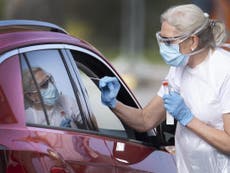Coronavirus: Ministers on collision course with advisers after rejecting warning of no vaccine for under-50s
Matt Hancock describes statement – by his vaccine task force – as ‘interim’ only, insisting he still wants a ‘full roll-out’
Your support helps us to tell the story
From reproductive rights to climate change to Big Tech, The Independent is on the ground when the story is developing. Whether it's investigating the financials of Elon Musk's pro-Trump PAC or producing our latest documentary, 'The A Word', which shines a light on the American women fighting for reproductive rights, we know how important it is to parse out the facts from the messaging.
At such a critical moment in US history, we need reporters on the ground. Your donation allows us to keep sending journalists to speak to both sides of the story.
The Independent is trusted by Americans across the entire political spectrum. And unlike many other quality news outlets, we choose not to lock Americans out of our reporting and analysis with paywalls. We believe quality journalism should be available to everyone, paid for by those who can afford it.
Your support makes all the difference.Ministers are on a collision course with their own vaccine experts, after rejecting advice that under-50s will not be given a Covid-19 jab.
Matt Hancock described the warning – by the head of the government’s vaccine task force – as “an interim guide” only, insisting he still wanted a “full roll-out”.
“We await the data from the clinical trials of the vaccine before we will come to a clinically validated full roll-out plan,” the health secretary told MPs.
Kate Bingham, of the Joint Committee on Vaccination and Immunisation, sparked controversy on Monday when she sought to squash “misguided” perceptions about a vaccine.
“There’s going to be no vaccination of people under 18. It’s an adult-only vaccine, for people over 50, focusing on health workers and care home workers and the vulnerable,” she told the Financial Times.
The advice made uncomfortable reading for Mr Hancock, who told a Downing Street press conference, earlier this year, that “everyone would be given the vaccine”.
Ms Bingham said the reality was that government was aiming to vaccinate about 30m people, out of a UK population of 67m, if a successful vaccine against coronavirus is found.
“People keep talking about ‘time to vaccinate the whole population’, but that is misguided,” she said.
Some public health experts suggested ministers had failed to properly explain to the public that many people are not in line to receive a vaccine.
“It hasn’t really been clearly communicated to the public,” said Devi Sridhar, professor of global public health at Edinburgh university.
But Mr Hancock, answering health questions in the Commons, insisted: “Decisions on the distribution of any vaccine have not been taken.
”The Joint Committee on Vaccination and Immunisation is the body that advises the government on the appropriate clinical prioritisation of vaccines. It has published an interim guide.”
The UK government is backing six vaccine candidates, including the best known being produced by AstraZeneca and Oxford university,
Deals with manufacturers have been done in multiples of 60m, but that is because all are likely to require two doses.
Ms Bingham said vaccination should be aimed at those “most at risk” and noted that healthy people – who are much less likely to have severe outcomes from Covid-19 – could suffer “some freak harm”.
The latest advice from the Joint Committee on Vaccination and Immunisation, published last week, states that “simple age-based [vaccination] programmes are usually easier to deliver and therefore achieve higher vaccine uptake”.
It places older adults in care homes and care home workers at the top of its priority list and then all adults aged 50 to 80 next on the list, with older age groups first.





Join our commenting forum
Join thought-provoking conversations, follow other Independent readers and see their replies
Comments